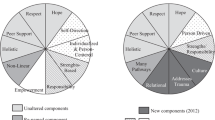Abstract
This study reports on the strategies used to implement the evidence-based practices of supported employment and integrated dual diagnosis treatment. Using qualitative research methods, the study uncovered eight strategies that contributed to successful implementation in six sites.
Similar content being viewed by others
References
Alvero, A. M., Bucklin, B. R., & Austin, J. (2001). An objective review of the effectiveness and essential characteristics of performance feedback in organizational settings (1985–1998). Journal of Organizational Behavior Management, 21(1), 3–29.
Atlas.ti (2002). Atlas (version 2.0) [computer software] Berlin, Germany: GmbH.
Balcazar, F. E., Hopkins, B. L., & Suarez, Y. (1985). A critical objective review of performance feedback. Journal of Organizational Behavior Management, 7, 65–89.
Bond, G. R., Evans, L., Salyers, M. P., Williams, J., & Kim, H. K. (2000). Measurement of fidelity in psychiatric rehabilitation. Mental Health Service Research, 2(2), 75–87.
Lehman, A. F., Steinwachs, D. M., & co-investigators. (1998). Patterns of usual care for schizophrenia: Initial results from the schizophrenia patient outcomes research team (PORT) client survey. Schizophrenia Bulletin, 24, 11–20.
Lincoln, S. L., & Guba, E. G. (1985). Naturalistic inquiry. Newbury Park: Sage Publications.
Locke, E., Shaw, K., Saari, L., & Latham, G. (1981). Goal setting and task performance: 1969–1980. Psychological Bulletin, 90(1), 125–152.
McHugo, G. J., Drake, R. E., Whitley, R., Bond, G. R., Campbell, K., Rapp, C. A., Goldman, H. H., Lutz, W., & Finnerty, M. (in press). Fidelity outcomes in the National Evidence-Based Practice Project. Psychiatric Services.
Nadler, D. A. (1977). Feedback and organization development. Using data based methods. Reading, MA: Addison-Wesley.
President’s New Freedom Commission on Mental Health. (2003). Achieving the promise: Transforming mental health care in America. DHHS Publication No. SMA-03-3832, Rockville, MD.
Rapp, C. A., & Goscha, R. (2006). The strengths model: Case management with people with psychiatric disabilities (2nd ed.). New York: Oxford University Press.
Rapp, C. A., Etzel-Wise, D., Marty, D., Coffman, M., Carlson, L., Asher, D., Callaghan, J., & Holter, M. (in press). Barriers to Evidence-Based Practice Implementation: Results of a Qualitative Study. Community Mental Health Journal.
Strauss, S., & Corbin, J. (1990). Basis of qualitative research. Newbury Park, CA: Sage.
Tashjian, M. D., Hayward, B. J., Stoddard, S., & Kraus, L. (1989). Best practice study of vocational rehabilitation services to severely mentally ill persons. Washington, DC: Washington Rehabilitation Services Administration, US Department of Education.
Taylor, M. S. (1987). The effects of feedback on the behavior of organizational personnel. Administration in Social Work, 11(3/4) Fall/Winter, 191–203.
Taylor, M. S., Fisher, C. D., & Ilgen, D. R. (1984). Individuals’ reaction to performance feedback in organizations: Control theory perspective. In K. M. Rowland, & G. R. Ferris (Eds.), Research in personnel and human resource management (Vol. 2, p. 810124). Greenwich, CT: JAI.
Torrey, W. C., & Gorman, P. G. (2005). Closing the gap between what services are and what they could be. In R. E. Drake, M. R. Merrans, & D. W. Lynde (Eds.), Evidence-based mental health practice (pp. 167–188). New York: W.W. Norton.
U.S. Department of Health, Human Services (DHHS). (1999). A report of the surgeon general. Washington, DC: Author, Wang, P. S., Demler, O., & Kessler, R. C. (2002).
West, J., Olfson, M., Narrow, W. E., Rae, D., Wilk Marcus, S., & Reier, D. A. (2003). The treatment in routine psychiatric practice. Paper presented at the Academy of Health Annual Meeting, Nashville, TN.
Acknowledgments
The authors would like to thank Professor Edward Canda from The University of Kansas School of Social Welfare and Greg McHugo from the Dartmouth College Psychiatric Research Center for their assistance with this paper. Developed by The University of Kansas School of Social Welfare Office of Mental Health Research and Training through a contract with the Kansas Department of Social and Rehabilitation Services.
Author information
Authors and Affiliations
Corresponding author
Rights and permissions
About this article
Cite this article
Rapp, C.A., Etzel-Wise, D., Marty, D. et al. Evidence-based Practice Implementation Strategies: Results of a Qualitative Study. Community Ment Health J 44, 213–224 (2008). https://doi.org/10.1007/s10597-007-9109-4
Received:
Accepted:
Published:
Issue Date:
DOI: https://doi.org/10.1007/s10597-007-9109-4




